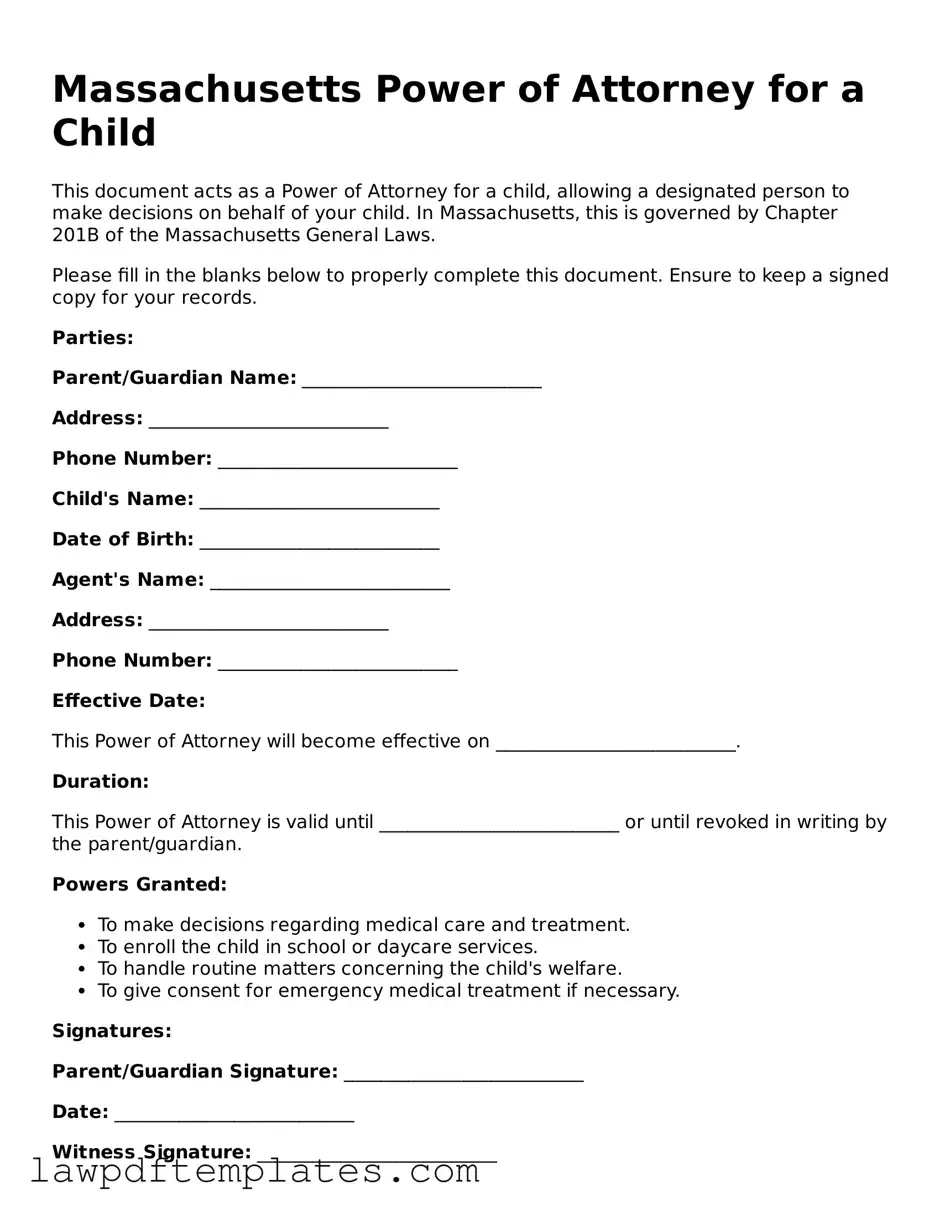Free Power of Attorney for a Child Template for the State of Massachusetts
Form Breakdown
| Fact Name | Description |
|---|---|
| Definition | The Massachusetts Power of Attorney for a Child form allows a parent or guardian to grant authority to another adult to make decisions on behalf of their child. |
| Governing Law | This form is governed by Massachusetts General Laws, Chapter 201B. |
| Purpose | It is typically used when a parent is unavailable due to travel, illness, or other reasons, ensuring that the child’s needs are met. |
| Duration | The authority granted can be temporary or permanent, depending on how the form is filled out and the needs of the family. |
| Signatures Required | The form must be signed by the parent or legal guardian and may also require notarization to be legally binding. |
| Health Care Decisions | It can include the power to make health care decisions, allowing the designated adult to act in medical emergencies. |
| Limitations | The form does not allow the designated adult to make decisions regarding the child's education or financial matters without additional authorization. |
| Revocation | The parent or guardian can revoke the Power of Attorney at any time, as long as it is done in writing. |
| Eligibility | Any adult can be designated as the attorney-in-fact, but it is advisable to choose someone trustworthy and responsible. |
| Legal Advice | While the form is straightforward, it is wise to seek legal advice if there are any concerns or complex family situations. |
Sample - Massachusetts Power of Attorney for a Child Form
Massachusetts Power of Attorney for a Child
This document acts as a Power of Attorney for a child, allowing a designated person to make decisions on behalf of your child. In Massachusetts, this is governed by Chapter 201B of the Massachusetts General Laws.
Please fill in the blanks below to properly complete this document. Ensure to keep a signed copy for your records.
Parties:
Parent/Guardian Name: __________________________
Address: __________________________
Phone Number: __________________________
Child's Name: __________________________
Date of Birth: __________________________
Agent's Name: __________________________
Address: __________________________
Phone Number: __________________________
Effective Date:
This Power of Attorney will become effective on __________________________.
Duration:
This Power of Attorney is valid until __________________________ or until revoked in writing by the parent/guardian.
Powers Granted:
- To make decisions regarding medical care and treatment.
- To enroll the child in school or daycare services.
- To handle routine matters concerning the child's welfare.
- To give consent for emergency medical treatment if necessary.
Signatures:
Parent/Guardian Signature: __________________________
Date: __________________________
Witness Signature: __________________________
Date: __________________________
Make sure that the document is signed in the presence of a witness. Once completed, this Power of Attorney should be treated as a legal document.
Common mistakes
Filling out the Massachusetts Power of Attorney for a Child form can be a straightforward process, but many individuals make common mistakes that can lead to complications down the line. Understanding these pitfalls can help ensure that the document serves its intended purpose effectively.
One frequent mistake is failing to provide complete information. It is crucial to include the full names, addresses, and contact details of both the parent and the designated agent. Omitting any of this information can create confusion and potentially invalidate the document.
Another common error involves not signing the form in the appropriate places. Each party involved must sign the document to confirm their agreement and understanding. Neglecting to obtain all necessary signatures can render the Power of Attorney ineffective.
Many people also overlook the importance of specifying the duration of the Power of Attorney. Without a clear start and end date, the document may remain in effect longer than intended, leading to unintended consequences.
In addition, individuals often forget to provide specific instructions regarding the powers granted to the agent. Vague language can lead to misunderstandings about what decisions the agent is authorized to make on behalf of the child.
Some parents mistakenly believe that a notary public is not necessary. In Massachusetts, notarization is required for the Power of Attorney to be legally binding. Skipping this step can result in the document being challenged or rejected.
Another misstep is failing to update the form when circumstances change. Life events such as relocation, changes in guardianship, or the agent's unavailability should prompt a review and potential revision of the Power of Attorney.
People sometimes neglect to discuss the arrangement with the child involved. Open communication can help the child understand the situation and the role of the designated agent, fostering a sense of security.
Additionally, using outdated versions of the form can lead to complications. Legal requirements can change, so it is essential to ensure that the most current version of the Power of Attorney for a Child form is being utilized.
Finally, individuals may not seek legal advice when needed. While it is possible to complete the form independently, consulting with a legal professional can provide clarity and ensure that all aspects are properly addressed.
Discover More Power of Attorney for a Child Templates for Specific States
Florida Power of Attorney Requirements - Your chosen agent can help navigate school and healthcare systems for your child.
Illinois Power of Attorney Requirements - Acts as a safeguard for a child's legal and medical rights.
For anyone looking to navigate complex legal issues, understanding the Georgia Power of Attorney form's implications is crucial. This document enables individuals to grant authority to someone they trust, facilitating important decisions regarding their health, finances, and legal matters. For more information, consult our guide on the critical Power of Attorney framework available here.
Free Power of Attorney for Minor Child Georgia - Useful for travel, emergencies, or unpredictable circumstances involving the child.
